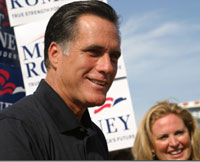 I finally got around to reading Mitt Romney’s December “Faith in America” speech, in which he talked about religion. It’s very good, and I fully respect what he said. Christianity is kind of the “dominant” religion of the US, and when you’re “in charge,” you don’t need to ask many philosophical questions about your place in the scheme of things. But as a Mormon, a minority religion, Romney has had to defend his faith and think deeply about religious issues as they affect citizenship.
I finally got around to reading Mitt Romney’s December “Faith in America” speech, in which he talked about religion. It’s very good, and I fully respect what he said. Christianity is kind of the “dominant” religion of the US, and when you’re “in charge,” you don’t need to ask many philosophical questions about your place in the scheme of things. But as a Mormon, a minority religion, Romney has had to defend his faith and think deeply about religious issues as they affect citizenship.
Here are a few excerpts. Nothing earth-shaking, but good stuff. Good stuff for us evangelicals, who became addicted to political power when the Moral Majority came to power (though I think we’re getting over it).
Let me assure you that no authorites of my church, or of any other church for that matter, will ever exert influence on presidential decisions. Their authority is theirs, within the province of church affairs, and it ends where the affairs of the nation begin.
There are some for whom these commitments are not enough. They would prefer it if I would simply distance myself from my religion, say that it is more a tradition than my personal conviction, or disavow one or another of its precepts. That I will not do. I believe in my Mormon faith and I endeavor to live by it.
Americans do not respect believers of convenience. Americans tire of those who would jettison their beliefs, even to gain the world.
No candidate should become a spokesman for his faith.
I believe that every faith I have encountered draws its adherents closer to God. And in every faith I have come to know, there are features I wish were in my own: I love the profound ceremony of the Catholic Mass, the approachability of God in the prayers of the Evangelicals, the tenderness of spirit among the Pentecostals, the confident independence of the Lutherans, the ancient traditions of the Jews, unchanged through the ages, and the commitment to frequent prayer of the Muslims. As I travel across the country and see our towns and cities, I am always moved by the many houses of worship with their steeples, all pointing to heaven, reminding us of the source of life’s blessings.
The establishment of state religions in Europe did no favor to Europe’s churches. And though you will find many people of strong faith there, the churches themselves seem to be withering away.
Any believer in religious freedom, any person who has knelt in prayer to the Almighty, has a friend and ally in me.
There are a few points which invite quibbling. One is his line, “Freedom requires religion, just as religion requires freedom.” I agree with the first part, but not the second. Religion has often thrived–or, at least, shined with the most genuine of light–when officially banned. But I suppose it makes sense in the context of the Mormon religion; Brigham Young and Company migrated west to find a place where they could freely practice this new religion.






1 Comment to "Mitt Romney on Religion"